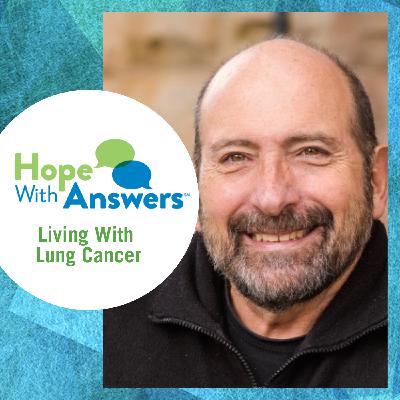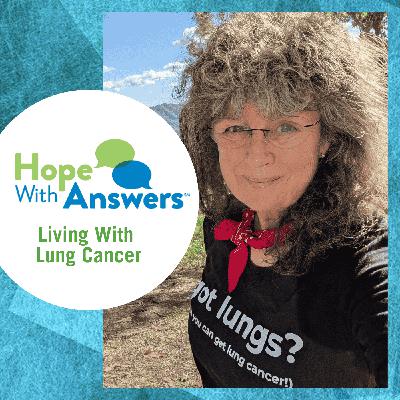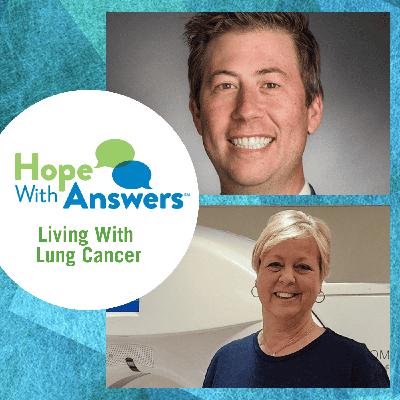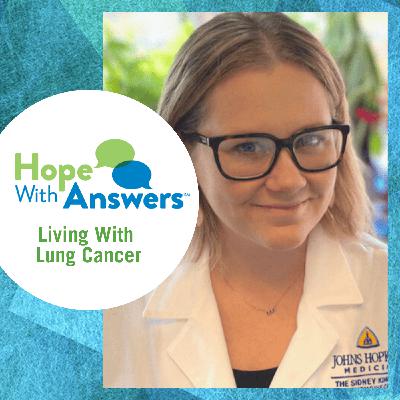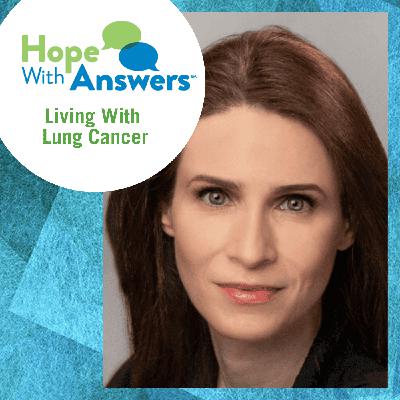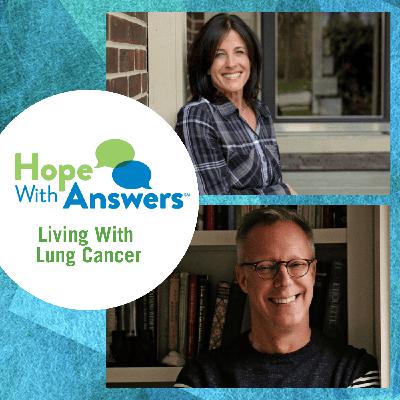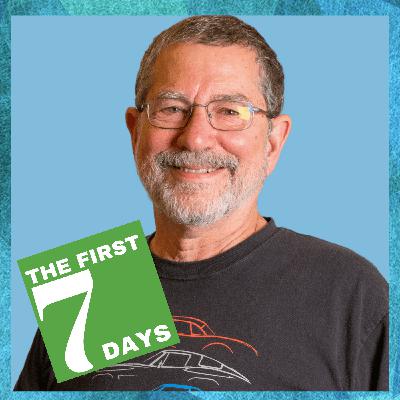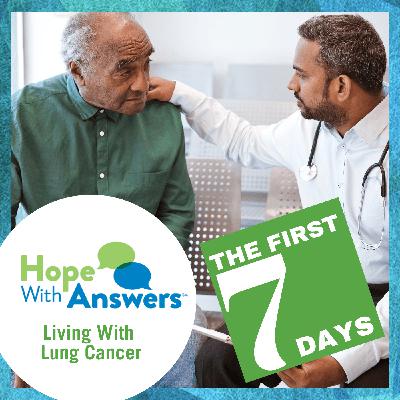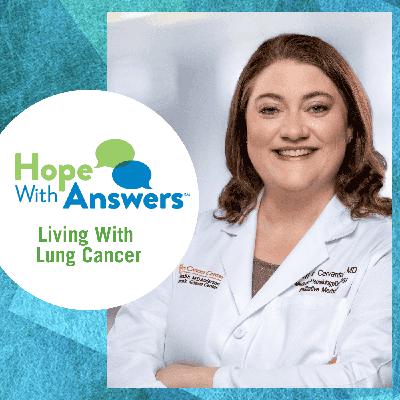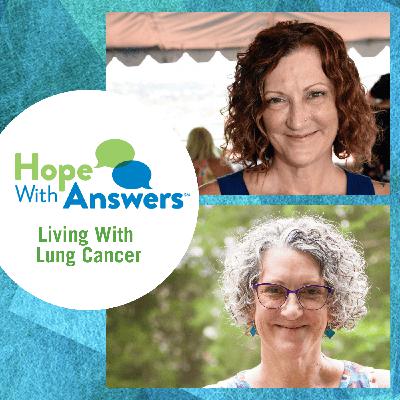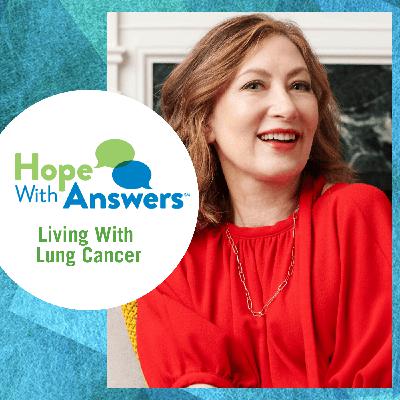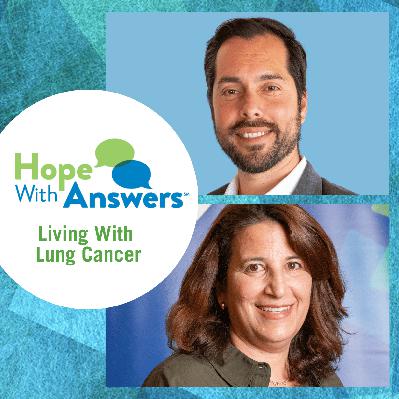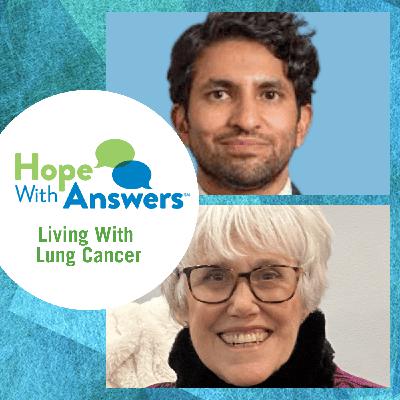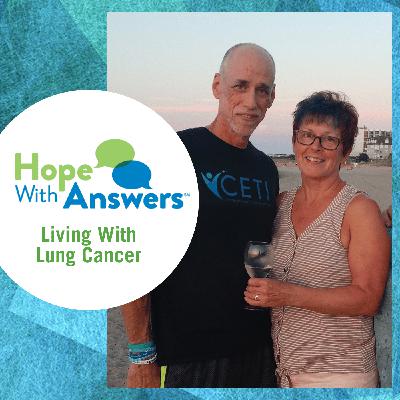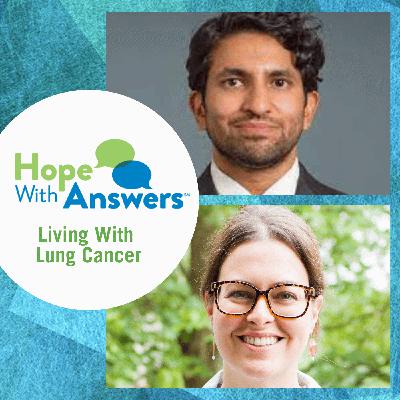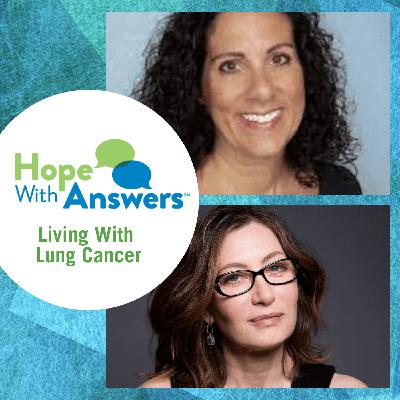Discover Hope With Answers: Living With Lung Cancer
Hope With Answers: Living With Lung Cancer

Hope With Answers: Living With Lung Cancer
Author: Lung Cancer Foundation of America
Subscribed: 7Played: 81Subscribe
Share
© Copyright 2019-2025 Lung Cancer Foundation of America All rights reserved.
Description
Find out what you need to know for your personal lung cancer journey through stories and interviews with patients, lung cancer specialists, and key participants in the quest for a cure.
70 Episodes
Reverse
Lung cancer screening is one of the simplest tools available in cancer care, yet it remains widely underused. A low-dose CT scan takes just a few minutes and can detect lung cancer at its earliest and most treatable stages.
Jim Pantelas is a Navy Veteran and a 20 plus year lung cancer survivor. He was diagnosed with stage 3B lung cancer at age 52, back when lung cancer screening was not available. Today, he is joining Dr. Drew Moghanaki, a thoracic oncology leader and VA physician, to deliver a clear message to Veterans and anyone with a smoking history.
Get screened. Every year.
Key Topics Discussed:
How lung cancer can grow with no symptoms until it is advanced
Why Veterans may face higher risk from airborne hazards and toxic exposures
What screening is like and why it takes less than three minutes
Why annual screening matters, not just one scan
How early detection expands treatment options and improves outcomes
How to access screening through the VA or through civilian healthcare
Why screening is covered and cost should not stop you
Featured Guests:
Jim Pantelas, Navy Veteran, 20 plus Year Lung Cancer Survivor
Dr. Drew Moghanaki, UCLA and VA Thoracic Oncology Leader
Key Takeaway:
Lung cancer is curable when caught early. If you are eligible, start screening at 50 and go every year.
Resources mentioned in this episode:
PACT Act Benefits and Eligibility: https://www.va.gov/resources/the-pact-act-and-your-va-benefits/
VA Lung Cancer Screening: https://www.prevention.va.gov/preventing_diseases/screening_for_lung_cancer.asp
Airborne Hazards and Burn Pit Registry: https://www.publichealth.va.gov/exposures/burnpits/registry.asp
LCFA Screening Information: https://lcfamerica.org/about-lung-cancer/detection/screening/
Show Notes | Transcript | Watch Video
Hashtags:
#LungCancer #VeteransHealth #CancerScreening #EarlyDetection #VAHealthcare #PACTAct #HopeWithAnswers #LCFA
Our nation's Veterans are on the front lines of a new fight: advocating for lung cancer screening and powering the next wave of research using blood tests to screen for lung cancer.
Air Force and Navy Veteran Donnita Butler shares how a simple low-dose CT scan saved her life after she advocated for screening despite initial pushback. Alongside Dr. Drew Moghanaki, a leading expert in Veterans' lung cancer care, they reveal how today's VA screening programs are catching cancer early when it's most curable—and how thousands of Veterans are donating blood to help develop tomorrow's breakthrough detection methods.
Key Topics Discussed:
Why Veterans face higher lung cancer risk due to toxic exposures (asbestos, burn pits, Agent Orange)
How the VA's new screening policy is saving lives by systematically identifying at-risk Veterans
The simple 3-minute screening process that can catch lung cancer at its earliest, most curable stage
Exciting research on blood-based biomarker tests that could detect cancer even before it shows on scans
How Veterans can access screening through the PACT Act and VA healthcare
The importance of biomarker testing and clinical trials in personalized treatment
Featured Guests:
Donnita Butler: Air Force and Navy Veteran diagnosed with stage 1A lung cancer through screening, now thriving at 70
Dr. Drew Moghanaki: Veterans Health Administration lung cancer specialist leading screening initiatives and biomarker research
Key Takeaway:
Lung cancer is curable if caught early. If you're a Veteran over 50 with a smoking history, talk to your doctor about screening today. As Dr. Moghanaki says: "Leave no one behind."
Show Notes | Transcript | Watch Video
Veteran Resources Mentioned in This Episode:
PACT Act Benefits & Eligibility - Expanded VA health care & benefits for Veterans exposed to burn pits and other toxic substances.
https://www.va.gov/resources/the-pact-act-and-your-va-benefits/
VA Lung Cancer Screening (Free LDCT Screening for Eligible Veterans)
Learn more and talk to your VA provider:
https://www.prevention.va.gov/preventing_diseases/screening_for_lung_cancer.asp
Airborne Hazards & Burn Pit Registry
Document deployment exposures and stay informed about related health concerns.
https://www.publichealth.va.gov/exposures/burnpits/registry.asp
Subscribe to Hope With Answers Living With Lung Cancer for more inspiring stories and breakthrough research updates.
Apple Podcast | Spotify | Amazon Music | iHeart
Join LCFA's social media communities for support and information.
Facebook | Twitter | Instagram | YouTube
#LungCancer #VeteransHealth #CancerScreening #EarlyDetection #VAHealthcare #PACTAct #ClinicalTrials #BiomarkerTesting #HopeWithAnswers #LCFA
Small cell lung cancer was once considered one of the most challenging diagnoses in oncology. But today, groundbreaking treatments are transforming patient outcomes and rewriting survival stories. Discover how immunotherapy, T-cell engagers, CAR T-cell therapy, and antibody drug conjugates are moving from clinical trials to standard care, offering patients years of disease control and genuine hope for the future. Featuring insights from Dr. Jacob Sands, thoracic oncologist at Dana-Farber Cancer Institute, and inspiring patient advocate Wendy Brooks, who shares her powerful journey from early detection through cutting-edge clinical trials, proving that advocacy and hope can change everything.
Guests:
Dr. Jacob Sands, Oncologist, Dana-Farber Cancer Institute
Courtney Mantz, Program Manager II, SCLC Program, Dr. Sands’ Assistant. Dana-Farber Cancer Institute, Lowe Center for Thoracic Oncology
Wendy Brooks, Patient Advocate
Show Notes | Transcript | Watch Video
Early detection of lung cancer can save lives. In this essential episode, two-time survivor and LCFA co-founder David Sturges shares how screening helped him beat lung cancer—twice. Joined by Dr. Denise Aberle and LCFA-funded researcher Dr. Kellie Smith, this episode dives into why lung cancer is often diagnosed late, what new screening methods can do to change that, and what the future of early treatment might look like.
Guests
David Sturges, Lung Cancer Survivor & LCFA Co-founder
Dr. Denise Aberle, Thoracic Radiologist, UCLA Medical Center
Kellie Smith, Ph.D., Assistant Professor of Oncology, Johns Hopkins University & LCFA Early Career Researcher
Show Notes | Transcript
Shining a light on the caregiving journey for lung cancer patients, Dr. Allison Applebaum, founder of the Caregiver’s Clinic at Memorial Sloan Kettering Cancer Center, and caregiver Gail Fackler, along with her husband, Jim, speak candidly about the mental health challenges caregivers face, including anxiety, depression, and PTSD. The conversation covers the overwhelming realities of caregiving, from managing medical decisions to coping with guilt and loss of identity.
Gail and Jim share raw, honest stories about how caregiving has transformed their lives and relationships. Practical strategies for caregivers—such as task management, setting boundaries, and finding support networks—offer hope and guidance. Learn more about the critical importance of mental health support for caregivers and the power of community in navigating this journey.
Guests
Dr. Allison Applebaum, Founding Director, Caregiver’s Clinic, Memorial Sloan Kettering Cancer Center
Gail and Jim Fackler, Lung Cancer Caregivers and Patient
Show Notes | Transcript | Watch Video
In this special re-release of Hope With Answers, lung cancer advocate Jill Feldman tackles a challenge that most patients never see coming—stigma. Originally aired in January 2020, this candid and emotional episode sheds light on the damaging assumptions patients face and how words can wound, even when well-intentioned.
From doctors and friends to complete strangers, the first question many patients hear is: “Did you smoke?” It's a question that implies blame—and lung cancer survivors like Jill Feldman have heard it far too often. In this episode, Jill teams up with journalist Steven Petrow to unpack the emotional toll of these encounters and offer advice on how to respond with grace and strength.
You'll also hear from Dr. Alice Berger, a lung cancer researcher investigating why young, non-smoking women are increasingly being diagnosed with lung cancer. Her work helps shift public perception and challenges outdated assumptions about who gets lung cancer—and why.
This episode explores:
The real impact of stigma on lung cancer patients
How language shapes the patient experience
What not to say to someone with lung cancer
How empathy and civility can reshape conversations
Groundbreaking research on lung cancer in non-smokers
Whether you're a patient, caregiver, or advocate, this episode will change the way you think—and talk—about lung cancer.
Show Notes | Transcript | Watch Video
Originally aired in May 2020, this final episode of The First 7 Days podcast series provides newly diagnosed lung cancer patients with crucial guidance on developing a personalized treatment plan. Building on the foundations established in previous episodes about finding the right medical team and understanding diagnostic testing, this concluding installment helps transform overwhelming information into actionable steps forward.
The landscape of lung cancer treatment has evolved dramatically, extending far beyond traditional chemotherapy. This episode navigates the expanding array of treatment options, including surgery, radiation therapy, targeted therapies, immunotherapy, and combination approaches. Listeners will learn how biomarker testing influences treatment selection and understand the potential role of clinical trials in their care plan.
Featured thoracic oncologists and patient advocates share valuable insights about:
How treatment decisions are made
Key factors influencing treatment selection
The role of biomarker testing in personalizing treatment
When to seek second opinions
Strategies for coordinating care across medical teams
While focused on the initial weeks after diagnosis, this episode sets the stage for long-term cancer management by providing practical tools and resources for ongoing decision-making.
Gain confidence in working collaboratively with your healthcare team while advocating for your needs throughout the treatment journey.
Guests
Dr. David Carbone, Oncologist at The Ohio State University
Transcript | Show Notes | Watch video
Resources
Download the First 7 Steps to share.
Subscribe to Hope With Answers Living With Lung Cancer podcast for future episodes on your favorite listening platform.
Apple Podcast | Spotify | Amazon Play | iHeart
Join LCFA’s social media communities for support and information.
Facebook | Twitter | Instagram | YouTube
A lung cancer diagnosis can feel overwhelming, but getting a second opinion could be a game-changer in your treatment journey. In this episode of the Hope With Answers: Living With Lung Cancer podcast, thoracic oncologist Dr. David Carbone, along with lung cancer survivors and advocates, discusses why seeking a second opinion—especially from a specialist at a university-based center—can provide access to cutting-edge treatments and clinical trials.
Lung cancer advocates share their personal experiences, emphasizing the importance of self-advocacy and finding a doctor who values additional insights. A second opinion isn’t about doubting your doctor—it’s about ensuring you have all the information needed to make the best decision for your health.
Tune in to learn why a second opinion could open new doors in your lung cancer treatment plan.
The First 7 Steps downloadable
Transcript | Show Notes
Just diagnosed with lung cancer? In this essential episode, thoracic oncologist Dr. David Carbone and lung cancer survivors share why you have time to breathe, gather information, and make informed decisions about your treatment journey.
Transcript | Show Notes
Originally released in May 2020 as part of The First 7 Days series, this timeless episode of the Hope with Answers Living with Lung Cancer Podcast remains an essential resource for anyone facing a lung cancer diagnosis. While treatment options continue to advance rapidly, the fundamental guidance shared in "The First 7 Days" about taking time to gather information, seeking appropriate testing, and finding the right medical team is as crucial today as it was when first aired.
As we wrap up 2024, LCFA's Hope With Answers host Mitch Jelniker presents our most downloaded episode of the year, featuring a transformative conversation about palliative care in the lung cancer journey.
Dr. Sherri Cervantez, Director of Palliative Oncology at UT Health San Antonio MD Anderson Cancer Center, joins lung cancer survivor Sally Cain for an enlightening discussion that changed how thousands view palliative care. Sally shares her unique perspective as both a Stage 4 lung cancer patient benefiting from palliative care and as someone who witnessed her late husband's journey without these vital services.
Key Highlights from Our Most Popular 2024 Episode
Debunking common myths about palliative care vs. hospice care
How early palliative care can transform your lung cancer journey
Real-world success stories of improved quality of life
Expert insights on building your optimal care team
Practical guidance on accessing and maximizing palliative care services
Insurance coverage and advocacy tips
This standout episode resonated deeply with our audience by addressing a critical yet often overlooked component of comprehensive lung cancer care. Whether you're a patient, caregiver, or healthcare provider, this discussion offers valuable insights into maximizing quality of life during treatment.
As LCFA prepares for an exciting 2025, we invite you to revisit this impactful conversation that continues to help patients and families better understand how palliative care can be a powerful ally in their lung cancer journey.
Show Notes | Transcript | Watch Video
Originally Published on: 2024-05-23
Resources:
Understanding Palliative Care
What is Palliative Care?
Palliative Care & Lung Cancer
In this foundational episode released in December 2019, lung cancer survivor Lysa Buonanno shares critical insights about navigating a lung cancer diagnosis. Her journey, which began at age 40 with persistent back pain, highlights the importance of comprehensive testing and informed decision-making in lung cancer treatment.
Today, more than 12 years after her initial diagnosis, Lysa continues to live with lung cancer. Her story, along with the expert perspectives from Dr. Carbone and Kim Norris, illustrates both the challenges of living with lung cancer and the hope offered by advancing research and treatment options. This episode remains relevant today, offering essential guidance for patients and families while highlighting LCFA's vital role in supporting research for new treatment options.
Show Notes | Transcript
Most Downloaded Episode: From COVID Test to Lung Cancer Diagnosis
Join host Mitch Jelniker as we revisit our most popular Hope With Answers episode featuring Annabelle Gurwitch - actress, author, and unexpected lung cancer advocate. What started as a routine COVID test in 2020 led to a shocking stage IV lung cancer diagnosis for this never-smoker.
With her signature wit, Annabelle shares how her tumor ("the size of a Clementine") changed everything. Despite being physically active and healthy except for a slight cough, she joined the growing number of never-smoker women facing lung cancer. Thanks to advances in targeted therapy for her EGFR mutation, Annabelle maintains an active life while advocating for crucial lung cancer research.
"I get to have the life I'm having right now because of the drugs that were developed in the last five years," she says, highlighting how research funding directly impacts patient survival and quality of life.
Listen as Annabelle brings humor and hope to a serious subject, demonstrating why this episode resonates with so many in the lung cancer community.
View Show Notes | Transcription
Delve into the world of adjuvant therapy for lung cancer patients through insightful discussions with Dr. Jonathan Villena-Vargas, an assistant professor of cardiothoracic surgery, and Lisa Goldman, a long-term lung cancer survivor and advocate.
Dr. Villena-Vargas provides a comprehensive overview of adjuvant therapy, explaining its role in preventing cancer recurrence after primary treatment. He clarifies the differences between neoadjuvant, adjuvant, and peri-adjuvant therapies, and discusses how treatment decisions are made based on cancer stage and type. The doctor emphasizes the importance of understanding one's specific diagnosis and asking the right questions about biomarkers and treatment options.
Lisa Goldman shares her personal journey with stage 4 lung cancer, diagnosed in 2014. Her story highlights the rapid advancements in lung cancer treatment over the past decade, from her initial aggressive chemotherapy to long-term targeted therapy. Lisa's experience underscores the critical role of research in extending and improving the lives of lung cancer patients.
This episode offers a balanced mix of expert medical insight and personal experience, making complex medical concepts accessible to a general audience. It serves as an invaluable resource for those navigating the challenges of lung cancer diagnosis and treatment, highlighting the significant progress made in recent years and the reasons for hope in the fight against this disease.
Guests
Jonathan Villena-Vargas, MD
Dr. Villena-Vargas is a clinician at Weill Cornell Medical Center, with particular expertise in the surgical management of lung cancer. He has written numerous clinical publications about screening, staging, and the management of thoracic cancers.
Lisa Goldman, Patient-Advocate
Diagnosed in 2014 with urgent stage 4 lung cancer, Lisa received immediate chemotherapy. She later co-founded The ROS1ders, a Facebook advocacy group for lung cancer patients.
Show Notes | Transcript | Watch video
Explore the remarkable small cell lung cancer treatment advancements that offer renewed hope to patients and their loved ones. Dr. Jacob Sands, a leading oncologist from the Dana-Farber Cancer Institute, and Maida Mangiameli, a small cell lung cancer survivor, share their expertise and experiences, providing a unique perspective on the latest breakthroughs in small cell lung cancer treatment.
Dr. Sands explains the differences between small cell and non-small cell lung cancer, emphasizing the aggressive nature of small cell lung cancer and the importance of early detection through lung screening. He highlights the significant progress made in lung cancer treatments, particularly the introduction of immunotherapy drugs as a standard of care in the first-line setting, leading to long-term disease control and potential cures for some patients.
The conversation shifts to the promising T-cell engager therapy, a novel approach that harnesses the immune system to target and destroy cancer cells. Dr. Sands uses a baseball analogy to illustrate the effectiveness of different treatments, suggesting that T-cell engagers may be hitting home runs more frequently, offering hope for longer-lasting responses with fewer side effects.
Maida Mangiameli shares her personal journey with small cell lung cancer, emphasizing the importance of a supportive oncology team and not blaming oneself for the disease. She addresses the stigma associated with lung cancer and the need for increased awareness and empathy.
Both Dr. Sands and Maida stress the significance of clinical trials in advancing small cell lung cancer treatment and encourage patients to discuss trial options with their doctors. They also touch on the importance of lung cancer screening for early detection, with Maida offering practical advice for newly diagnosed patients.
The small cell lung cancer treatment advancements, particularly the emergence of T-cell engager therapy, provide tangible reasons for patients and their loved ones to remain hopeful, offering the promise of longer, healthier lives for those affected by this challenging disease.
Show Notes | Transcript | Watch Video
Palliative care is an approach that improves the quality of life of patients and their families facing life-threatening illness. A team of doctors, nurses, social workers, and other specialists work with a patient’s existing physicians to provide an extra layer of support and specialized care. Palliative care aims to alleviate suffering, nurture comfort, and promote understanding for people living with lung cancer. It is a holistic and compassionate care designed to relieve symptoms, pain, and stress.
Guests
Sherri Cervantez, MD, Director of Palliative Oncology, UT Health San Antonio MD Anderson Cancer Center
Sally Cain was diagnosed with Stage 4 lung cancer in May 2022 after experiencing a nagging pain in her right side. Sally has experienced great support from her Palliative Care team in Texas. Her husband died a year before, and regrettably, he did not have a palliative care team.
Show Notes | Transcript | Watch Video
Resources
Understanding Palliative Care
What is Palliative Care?
Palliative Care & Lung Cancer
Cada año, alrededor de 6.000 hombres hispanos y 5.800 mujeres hispanas serán diagnosticados con cáncer de pulmón. El cáncer de pulmón es la principal causa de muerte por cáncer entre los hombres hispanos y la segunda causa entre las mujeres hispanas. Por eso la detección temprana es fundamental.
El Dr. Jonathan Villena-Vargas, un reconocido experto en cáncer de pulmón, y Yovana María Portillo, una sobreviviente de cáncer de pulmón, se reúnen en este podcast informativo para compartir sus ideas y experiencias, ofreciendo esperanza y orientación a los pacientes y sus familias, en particular a aquellos en el Comunidad hispana. Discuten la definición y los tipos de cáncer de pulmón, enfatizando que cualquier persona con pulmones puede desarrollar la enfermedad, no solo los fumadores.
La historia personal de Yovana como nunca fumadora diagnosticada a los 35 años resalta la importancia de la detección temprana y una mayor conciencia de los factores de riesgo más allá del tabaquismo. El podcast explora los últimos avances en opciones de tratamiento, incluida la cirugía, la quimioterapia, la radiación, las terapias dirigidas, la inmunoterapia y la terapia combinada, que se adaptan al tipo y estadio específico del cáncer de pulmón de cada paciente. Yovana comparte su viaje a través de la abrumadora experiencia de un diagnóstico de cáncer de pulmón, aprendiendo nueva terminología médica y tomando decisiones de tratamiento con su equipo médico, al mismo tiempo que arroja luz sobre los factores culturales que impactan la experiencia del cáncer de pulmón en las comunidades hispanas.
Tanto la Dra. Villena-Vargas como Yovana enfatizan la importancia de desestigmatizar el cáncer de pulmón, promover la detección temprana mediante pruebas de detección y fomentar la comunicación abierta con los proveedores de atención médica. A lo largo del podcast, ofrecen una poderosa combinación de conocimientos médicos y experiencia personal, brindando a los pacientes conocimiento y esperanza, y trabajando incansablemente para mejorar los resultados y la calidad de vida de los afectados por el cáncer de pulmón.
Invitados
Jonathan Villena-Vargas, MD; Profesor asistente de cirugía cardiotorácica en el Hospital Presbiteriano de Nueva York, Weill Cornell Medicine
Yovana María Portillo, defensora del paciente y Voz de la Esperanza: miembro de la Oficina de Oradores de la LCFA
Mostrar notas | Transcripción | Ver video
Recursos adicionales
El impacto del cáncer de pulmón en la comunidad hispana | Instituto del Cáncer Rutgers de Nueva Jersey
¿Cómo afecta el cáncer de pulmón a los latinos?
Cómo detectar el cáncer de pulmón: detección temprana y más | LCFA
El cáncer y los hispanoamericanos | Oficina de Salud de las Minorías
Historia del consumidor - Yovana Portillo – Accidentalmente libre de cáncer, programa de investigación del cáncer de pulmón, programas de investigación médica dirigidos por el Congreso
Discover empowering strategies for lung cancer caregiving in the Hope with Answers podcast. Gain insights from experts and a survivor's story on balancing care with self-care. This episode is a must-watch for any caregiver seeking guidance, support, and the strength to navigate their vital role with grace and resilience.
Guests:
Jenni Daniel, BSN, RN - Life Coach for lung cancer survivors and their partners, helping them to navigate their cancer journey. Jenni owns and operates the MyNurse At Home, a cancer and life coach center.
Frank and Debbie McKenna, Lung Cancer survivor joined by his wife/caregiver.
Show Notes | Transcript | Watch video
Numerous resources are available to assist both lung cancer patients and their caregivers in this journey.
My Nurse At Home
What is a Lung Cancer Caregiver?
Caring for Someone with Lung Cancer: What to Know
Taking Care of Yourself When You're a Cancer Caregiver | What You Need to Know
Lung Cancer: Being a Better Caregiver
LCFA’s mission is the improvement in survivorship of lung cancer patients through the funding of transformative science.
While raising funds to support lung cancer research, LCFA will raise the public’s awareness and serve as a resource for patients or anyone seeking answers, hope, and access to updated treatment information, scientific investigation, and clinical trials.
You can also join the conversation with LCFA on Facebook, Twitter, and Instagram.
Explore the critical role of biomarker testing in lung cancer treatment with Dr. Salman Punekar, Medical Oncologist at NYU Langone Health. Specializing in early-phase clinical development, Dr. Punekar explains the function of the biomarker STK11, a newer discovery shaping approaches to non-small cell lung cancer therapies.
Guests
Salman R. Punekar, MD, Assistant Professor of Medicine of Medical Oncology at NYU Langone Health. Specialization in early-phase clinical development and translational research.
Stephanie Williams, Lung Cancer survivor and clinical trial participant
Show Notes | Transcript | Watch Video
Unlocking Treatment Pathways for Lung Cancer
Highlighting the crucial role of biomarker testing in lung cancer, take an in-depth look at the function of STK11 as a tumor suppressor gene and its impact when mutated. Learn more about the latest research on the STK11 biomarker's influence on treatment strategies for non-small cell lung cancer from Dr. Salman Punekar. Dr. Punekar explains the function of STK11 as a tumor suppressor gene and its implications when mutated, affecting the efficacy of therapies like immunotherapy. STK11 is believed to negatively influence response to immune checkpoint inhibitors (ICIs) in non–small-cell lung cancer (NSCLC).
Then hear from Stephanie Williams, a lung cancer patient who underscores the life-changing impact of clinical trials, which informed her treatment and emphasized the importance of biomarker discovery. She shares why she advocates for patient education, the pursuit of clinical trials, and the need for ongoing research to improve lung cancer care.
In this Hope With Answers episode, host Diane Mulligan interviews Dr. Tejas Patil, an oncologist specializing in lung cancer, about ROS1-positive lung cancer. As Dr. Patil explains, "ROS1 is a type of mutation that we see in patients who have lung cancer. It's one of many but it's an important one because there is targeted treatments available to these patients that really are not like chemotherapy."
A ROS1-positive lung cancer, also known as a ROS1 rearrangement in lung cancer, refers to any lung cancer that tests positive for a fusion in the ROS1 gene. ROS1 rearrangements occur in approximately 1-2% of non-small cell lung cancer (NSCLC) patients. ROS1-positive lung cancer tends to be aggressive and can spread to the brain and the bones.
The hosts also speak with Lysa Buonanno, a 12-year lung cancer survivor and patient advocate living with ROS1-positive lung cancer. Lysa stresses the importance of self-advocacy.
"You have to keep advocating for yourself. Throughout this entire process I think that is so critically important."
She describes her excitement at being able to join a clinical trial for a new targeted therapy when her cancer progressed.
Overall, the episode provides critical information about this rare form of lung cancer, highlights new research and treatments, and offers inspiration through Lysa's story. As Diane says, not only do Dr. Patil and Lysa help us understand ROS1 lung cancer, but they also give hope to anyone living with lung cancer.
Guests
Tejas Patil, MD, Assistant Professor, Medicine-Medical Oncology, University of Colorado Anschutz Medical Campus
Lysa Buonanno, Lung Cancer survivor, a mother of two, who has ROS1 mutation and is being treated with the targeted therapy.
Show Notes | Transcript | Watch video
Sexual side effects of a lung cancer diagnosis can be physical, mental, and emotional. Sexuality is about emotional connection and the expression of intimacy. However, a lung cancer diagnosis can change the emotional needs of each partner. Further impacting the situation, sexual problems are not often discussed during oncology visits. And having a sex talk with your doctor may be intimidating. In this podcast, we undercover what lung cancer patients and their partners can expect and how to best discuss these issues with their health care professionals.
Questions like:
How does a lung cancer diagnosis impact intimacy in relationships?
What are some of the physical side effects of lung cancer treatment that can affect intimacy?
How does the emotional burden of a cancer diagnosis affect sexual desire and communication in relationships?
Guests:
Jenni Daniel, BSN, RN, Life Coach for lung cancer survivors and their partners, helping them to navigate their cancer journey. Jenni owns and operates the MyNurse At Home, a cancer and life coach center.
Annabelle Gurwitch, Lung Cancer survivor, actress, activist, and best-selling author went for a Covid test and left with a stage 4 lung cancer diagnosis. Annabelle’s story of an accidental lung cancer diagnosis is a very common story among lung cancer patients. In Annabelle’s case, getting an accurate diagnosis indicates her biomarker, EGFR Exon21.
Show Notes | Transcript | Watch Video


